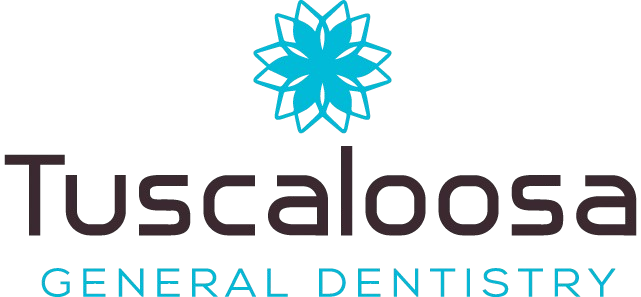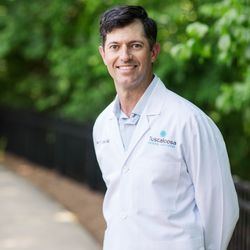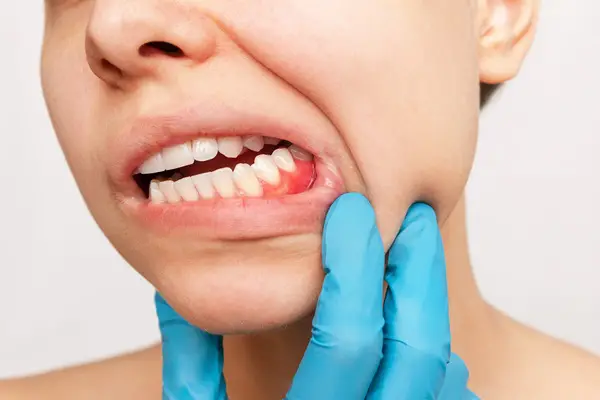Oral Cancer Screening
Oral cancer, also known as mouth cancer, refers to the uncontrollable growth of cells in the oral cavity. This type of cancer can develop in various parts of the mouth, including:
- Lips
- Tongue
- Cheeks
- Gums
- The floor of the mouth
- Roof of the mouth (palate)
- Throat (oropharynx)
Oral cancer is a subtype of head and neck cancer, and it can spread to other areas of the body if left untreated. While oral cancer is relatively less common than other forms of cancer, it is still a significant health concern. Early detection and treatment are critical to improving the chances of survival and reducing the severity of treatment. Contact us to learn more.
What Happens During an Oral Cancer Screening in Tuscaloosa, AL?
At Tuscaloosa General Dentistry, our dentist in Tuscaloosa, AL performs a thorough oral cancer screening as part of your routine dental exam. The screening is quick, painless, and non-invasive, making it easy to incorporate into your regular dental visits.
Step 1: Visual Examination
Dr. Carlson will begin by visually examining your mouth, throat, and surrounding areas for any abnormalities. During this visual inspection, he will look for:
- Red or white patches in the mouth
- Sores or ulcers that do not heal within two weeks
- Unusual lumps or bumps
- Thickened areas of tissue
- Any other changes in the appearance of the oral tissues
This visual examination covers all areas of the oral cavity, including the lips, tongue, gums, and the roof and floor of the mouth. Dr. Carlson will also inspect the back of your throat and the sides of your neck for any signs of abnormalities.
Step 2: Physical Examination
Next, Dr. Carlson will perform a physical examination by gently palpating (feeling) the tissues in your mouth, jaw, and neck. This helps identify any lumps, swelling, or hardened areas that may not be visible during the visual exam. During this process, he will also check the lymph nodes in your neck, as enlarged lymph nodes can sometimes indicate the presence of oral cancer or other infections.
Step 3: Additional Diagnostic Tools (if needed)
In some cases, Dr. Carlson may use advanced diagnostic tools to further assess any suspicious areas. These may include:
- Specialized lights: Some dentists use special lights that make abnormal tissues appear different from healthy tissues under illumination. This can help identify areas of concern that may not be visible to the naked eye.
- Tissue staining: A staining dye may be applied to areas of the mouth to highlight abnormal tissues, helping to differentiate between normal and potentially cancerous areas.
- Biopsy: If Dr. Carlson identifies an area that looks suspicious, he may recommend a biopsy, in which a small sample of tissue is taken for further examination in a laboratory. A biopsy is the most definitive way to determine whether cancerous cells are present.
Risk Factors for Oral Cancer
While oral cancer can affect anyone, certain factors can increase the risk of developing this condition. Being aware of these risk factors can help you take preventive measures and stay vigilant about scheduling regular screenings.
Tobacco Use
Smoking cigarettes, cigars, or pipes, as well as using smokeless tobacco (chewing tobacco or snuff), is one of the leading risk factors for oral cancer. Tobacco use introduces harmful chemicals into the body, which can damage the tissues in the mouth and throat, increasing the likelihood of cancer development.
Heavy Alcohol Consumption
Excessive alcohol consumption is another major risk factor for oral cancer. Individuals who drink heavily are more likely to develop cancer in the mouth or throat, especially when combined with tobacco use. The combination of alcohol and tobacco significantly raises the risk of oral cancer.
Human Papillomavirus (HPV) Infection
HPV, a common sexually transmitted infection, has been linked to certain types of oral and oropharyngeal cancers. The HPV-16 strain, in particular, is associated with cancers in the throat and back of the mouth. Practicing safe sex and getting vaccinated against HPV can help reduce this risk.
Prolonged Sun Exposure
Frequent and prolonged exposure to the sun can increase the risk of developing lip cancer. Individuals who spend a lot of time outdoors without proper sun protection are at higher risk, particularly those with fair skin. Using lip balm with SPF and wearing a wide-brimmed hat can help protect the lips from harmful UV rays.
Poor Diet and Nutrition
A diet that lacks fruits and vegetables may increase the risk of oral cancer. A balanced diet rich in vitamins, antioxidants, and other nutrients can help maintain overall oral health and reduce the likelihood of cancer development.
Age and Gender
Oral cancer is more common in individuals over the age of 50, with men being more likely to develop the disease than women. However, oral cancer can occur at any age, so regular screenings are essential for individuals of all demographics.
Weakened Immune System
Individuals with weakened immune systems, such as those undergoing cancer treatment, living with HIV, or taking immunosuppressive medications, may be at higher risk of developing oral cancer. It's important for these individuals to undergo regular oral cancer screenings and maintain good oral hygiene.
Symptoms of Oral Cancer
Oral cancer can present with various symptoms, but some of the most common signs include:
- Persistent mouth sores or ulcers that do not heal
- Red or white patches on the gums, tongue, or lining of the mouth
- Lumps or thickened areas in the mouth, throat, or neck
- Difficulty chewing, swallowing, or moving the jaw
- Chronic sore throat or hoarseness
- Numbness or tingling in the tongue or other areas of the mouth
- Unexplained bleeding in the mouth
- Loose teeth without any clear cause
- Persistent earaches
If you experience any of these symptoms for more than two weeks, it's important to schedule an appointment with Dr. Carlson for an evaluation. Keep in mind that these symptoms do not always indicate cancer, but they should be investigated to rule out any serious conditions.
Preventive Measures for Oral Cancer
In addition to regular screenings, there are steps you can take to reduce your risk of developing oral cancer:
Quit Smoking and Tobacco Use
One of the most effective ways to prevent oral cancer is to quit smoking and using tobacco products. By eliminating these harmful habits, you can significantly lower your risk of developing cancerous tissues in the mouth and throat.
Limit Alcohol Consumption
Drinking alcohol in moderation can reduce your risk of oral cancer. For men, this means limiting alcohol to two drinks per day, and for women, one drink per day. Avoid binge drinking or excessive alcohol consumption.
Practice Good Oral Hygiene
Maintaining good oral hygiene can help prevent infections and reduce the risk of developing oral cancer. This includes brushing your teeth twice a day, flossing daily, and visiting Tuscaloosa General Dentistry for regular cleanings and exams.
Protect Your Lips from the Sun
To reduce your risk of lip cancer, apply sunscreen or lip balm with SPF protection when spending time outdoors. Wearing a wide-brimmed hat can also provide additional protection.
Eat a Healthy Diet
Incorporate plenty of fruits and vegetables into your diet, as they contain important nutrients and antioxidants that can help protect your cells from damage. A well-balanced diet supports your immune system and overall health.
Get Vaccinated Against HPV
The HPV vaccine is effective in preventing certain strains of the virus that are linked to oral cancer. If you're eligible for the vaccine, it's a good preventive measure to consider, especially if you're under the age of 26.
Stay Healthy with Oral Cancer Screening
Oral cancer screening is a vital part of maintaining your oral and overall health. By catching potential issues early, Dr. John Carlson and the team at Tuscaloosa General Dentistry can help you stay ahead of any serious health concerns and provide effective treatment when needed. If you're due for an oral cancer screening or have noticed any unusual changes in your mouth, schedule an appointment today to safeguard your health.
Ready to achieve your best smile? Schedule your appointment with Dr. John Carlson at Tuscaloosa General Dentistry today! Call us at (205) 553-4477 or visit us at 631 Helen Keller Blvd #200, Tuscaloosa, AL 35404, and let us help you on your journey to optimal dental health.
Composite Bonding
Fixed Dentures
Implant-Supported Dentures
Denture & Partials
Dental Implant Restoration
Dental Bridges
Composite Dental Fillings
Restorative Dentistry
Sports Mouth Guards
Fluoride Treatment
Dental Cleaning & Exams
General Dentistry
Teeth Whitening
Dental Bonding
Cosmetic Dentistry
Complex Case Solutions
Veneers
Night Guards / TMJ Treatment
Crowns
TMJ Treatment


Office Hours
MON8:00 am - 5:00 pm
TUE8:00 am - 5:00 pm
WED8:00 am - 5:00 pm
THU7:00 am - 3:00 pm
FRIClosed
SATClosed
SUNClosed





